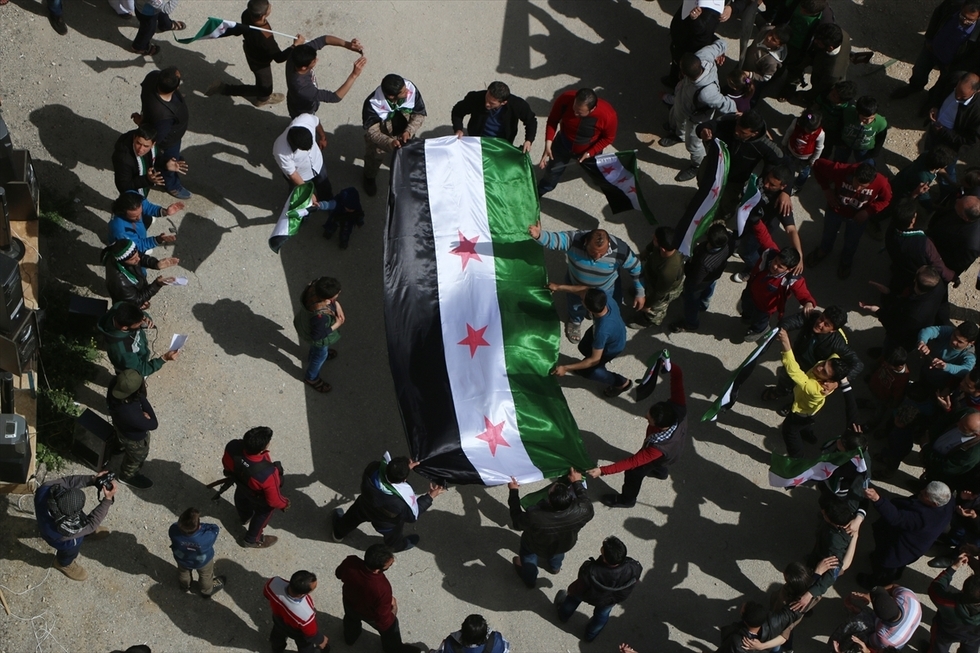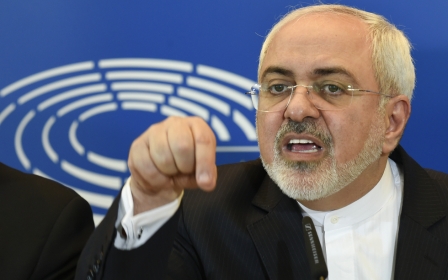Syria's uprising was to topple dictatorship, not divide the country

In a sudden manner, and without prior warning, official Russian and United States statements succeeded one another, not without some ambiguity, about the prospect of turning Syria into a federal state.
Since the Americans and the Russians are the sponsors of the process of finding a political solution for the Syrian crisis, a process that has been going on rather slowly and with considerable faltering, the statements emanating from both had to be taken seriously.
What Russian Foreign Minister Sergei Lavrov and US Secretary of State John Kerry had been talking about with some ambiguity has become much clearer in the statement made to Aljazeera news channel on 10 March by the international envoy to Syria Staffan de Mistura (as well as by the remarks the Israeli defence minister made at the Wilson Institute a few days afterwards).
De Mistura is also aware of the danger and likely impact of the reference, at any level, to dividing Syria. For this reason he started by sending a positive message, saying that Syrians agree on keeping their country united. However, the UN envoy concluded his discussion of the subject with a remark that contradicted his positive prelude, stressing that federalising he Syrian State would be put on the table of discussion among the Syrian parties in Geneva.
What officials such as Lavrov, Kerry and de Mistura state in one way or another is echoed in the papers that come out of Western think tanks conducting research on Syria and Iraq or in the readings of former Western specialists and officials among whom it has become common to say that the Middle East is in need of a new Sykes-Picot.
Delegates representing the Syrian regime of Bashar al-Assad and the Syrian opposition forces convened for talks aimed at finding a political solution for the Syrian crisis. The talks were also being attended by independent personalities handpicked by envoy de Mistura, the main referee in the negotiations process.
The astonishing thing is that the notion of federalisation was not born within the circles of the Syrian parties that are primarily concerned with resolving the crisis nor within the circles of what is known as the independent opposition. With the exception of the Kurdish Democratic Union, which is the arm of the Turkey's Kurdish Workers' Party (PKK) in Syria, the idea of federalisation did not figure in any statement or political document emanating from any of the leaders representing the Assad regime or representing the opposition, whether military or political.
The Syrian majority sees the Assad regime, which represents a continuation of his father’s own regime, as a sectarian authority that represents the Alawites, who constitute its backbone and main constituency. However, the Syrian revolution did not erupt for sectarian regions. Or, to put it more accurately, the sectarian dimension of the regime did not top the list of concerns for the hundreds of thousands of Syrians who took to the streets of their country’s cities and towns in March 2011 in what become the first spark of the revolution.
The primary and most prominent target of the revolution was the despotic nature of the regime and the policy of repression and control pursued by the regime and by its security agencies.
Throughout the past five years, the regime’s sectarian characteristic was only brought up in as much as it represented one of the underpinnings of the ruling regime and its minority-based nature. In contrast, what the Syrians have been demanding is not the establishment of a Sunni majority regime but one that guarantees freedom and justice for all Syrians.
It could have been possible for the Syrian revolution not to turn into the sort of civil war and regional and international crisis it has now become. This could have been averted had the regional and international powers agreed to support the movement and demands of the Syrian people and help the Syrians to take their country in the direction of a democratic system of governance that embraced all strands and forces within the nation. Had this happened, the Syrian crisis would not have dragged on for five bloody years.
However, the superpowers, in addition to regional powers, were divided over Syria into those who support the regime and those who support the popular revolution. In other words, it would seem that proposing the idea of federalism comes today in a bid to resolve the dilemma of the division among external powers over Syria and not for the purpose of fulfilling a Syrian demand. This is just as Sykes-Picot was an agreement aimed at resolving the problem of competition and the dispute over influence among the allied powers in World War I.
This spring will see the first centenary of the signing of the Sykes-Picot agreement. One hardly finds a single school pupil in the former Ottoman countries who does not remember it with contempt and a sense of humiliation. In fact, Sykes-Picot is a codename for three agreements that together laid the foundations for the idea of dividing the Ottoman State among the allied European powers during World War I.
The first agreement was called the Constantinople agreement. This was signed in the Russian capital of St Petersburg in the spring of 1915. According to this agreement, Britain and France agreed to award the Ottoman straits and their European and Asian coasts (including Istanbul itself) to Russia.
The second agreement was signed in the British capital London one year after the first one, that is in the spring of 1916. According to this agreement, the Arab majority provinces and those in southern Anatolia were divided between France and Britain. This agreement was named after its two negotiators, Mark Sykes and George Picot.
The third agreement, which was known as the St Jean de Maurienne agreement, was signed in the middle of 1917. It was an agreement between Britain and France to award Italy the southwestern part of Anatolia (what is today Antalya) in exchange for joining the allied camp in the war.
Matters did not end here. Upon the surrender of the centre camp, Bulgaria, Austria, the Ottoman Sultanate and Germany, and announcing the end of the war, Britain and France consented to Greece seizing control of Ottoman Izmir and its surroundings in 1919. This is the step that ignited the Ottoman war of independence under the leadership of Mustafa Kamal against the forces of the allied countries that ended up occupying much of what had remained of the Ottoman Sultanate.
The secret agreement of the allies during the war years never materialised, by virtue of the withdrawal of Russia from the war in the wake of the Bolshevik revolution in 1917, the Ottoman war of independence and Britain’s retraction of its pledges to France in Sykes-Picot. However, the idea of sharing the booty was not entirely abandoned. The Ottoman war of independence succeeded in accomplishing, upon a thoroughly considered armistice, the freedom and independence of the region that remained out of the Sultanate in what became the Turkish Republic.
However, this success did not completely protect Turkey from the repercussions of the imperialist partitioning of other Sultanate territories that became known as Iraq, Syria, Lebanon, Jordan and Palestine that were booty shared between Britain and France. In a similar fashion to the debate that has recently been initiated about the future of Syria (and, prior to that, of Iraq), the populations of the Ottoman lands had no say whatsoever in the manner in which their homelands were divided; nor did they have any connection with the birth of the idea of partition in the first place.
The post-World War I order was born out of the ambitions of the imperialist powers and the endeavour, from then on, by each of them to accomplish their strategic objectives in the Orient through a process of negotiations and with the spirit of sharing the war booty. The consequences were catastrophic for the Orient and its inhabitants even after the newly created states achieved their independence.
The post Ottoman Sultanate states were born as random units, without any of them possessing the elements of stability and prosperity. They were born obsessed with suspicion toward each other. Governance in each of these states was handed over to minority groups, whether social, sectarian or military, without sufficient solid foundation for the development of democratic systems of governance that could express the will of the majority of the public.
By virtue of the fact that the post-World War I order was inherently nationalistic and was designed along the lines of the nation-state, it soon gave birth to the Kurdish question, which became a factor of long-term and rather costly destabilisation in all of the countries of the Orient. The biggest catastrophe of all was the creation of a state for Jewish immigrants in Palestine.
The repercussions of the notion of division and partition that created the post-World War I order continues to haunt the Orient and its peoples in terms of the loss of stability and prosperity and a series of civil strife and wars erupting one after the other. A return to the policy of division and partition in order to resolve crises that were created by the post-World War I order will only lead to further destabilisation, civil conflicts and wars and the loss of livelihood.
- Basheer Nafi is a senior research fellow at Al Jazeera Centre for Studies.
The views expressed in this article belong to the author and do not necessarily reflect the editorial policy of Middle East Eye.
Photo: Syrians chant slogans and hold Syrian flags during a protest against the regime of President Bashar al-Assad after Friday prayers in the rebel-held Kafr Hamrah village of Aleppo, Syria on 25 March, 2016 (AFP).
New MEE newsletter: Jerusalem Dispatch
Sign up to get the latest insights and analysis on Israel-Palestine, alongside Turkey Unpacked and other MEE newsletters
Middle East Eye delivers independent and unrivalled coverage and analysis of the Middle East, North Africa and beyond. To learn more about republishing this content and the associated fees, please fill out this form. More about MEE can be found here.





